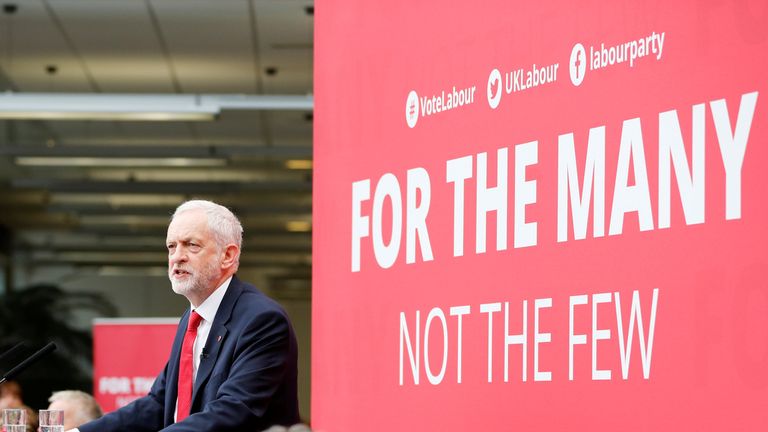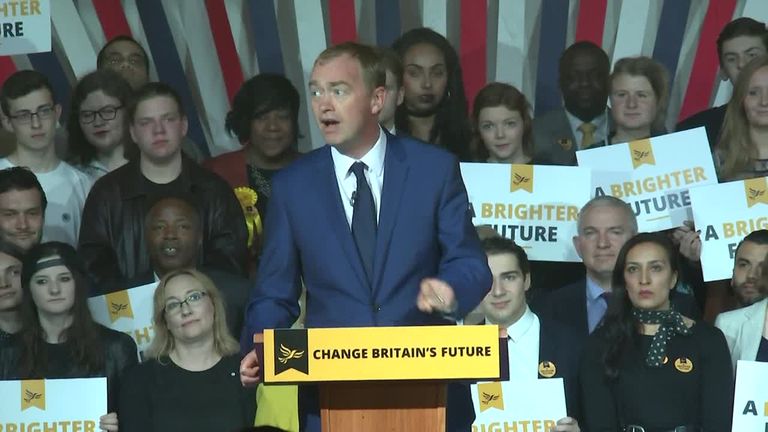UK in the midst of a near unprecedented stretch of borrowing
The parties' deficit stances mean we're in the midst of what will be the longest period of borrowing since Napoleonic times.
Thursday 18 May 2017 20:50, UK
So does it all add up? It's the question I always tend to get asked when we get a political blueprint, or a manifesto, or a Budget.
But in the case of the Conservative manifesto, or for that matter the Labour and Lib Dem manifestos from earlier this week, it's not clear it's the most important issue at hand.
For all that people like to trot out that tired James Carville quote about how in elections "it's the economy, stupid", I cannot think of another election that has been less about the economy. All of the party leaders seem happy to have effectively relegated economic growth from their list of priorities.
And when it comes to the Conservative manifesto, actually the most interesting thing is what isn't in it, rather than what is.
Gone are the big, concrete pledges from last time around: the tax lock which prevented the Government from raising income tax, National Insurance or VAT is replaced with a single tax lock (VAT won't be going higher).
The pensions triple lock (the state pension will go up in line with wages growth, inflation or 2.5% - whichever is the highest) is gone, replaced with a double lock (pensions go up by the higher of wages or inflation).
The Fixed-term Parliaments Act is out the window, as is the promise to eliminate the deficit within a few years - instead the new promise is to get to balance by the middle of the next decade.
These promises are difficult to cost, but they are nonetheless deeply significant: the Treasury will be delighted its hands are no longer tied by that tax lock.
The double lock will make little long-term difference to the affordability of pensions, but is nonetheless an important gesture: for the first time in decades, the government-in-waiting is being bold enough to cut the generosity of their offering to pensioners.
The fixed-term parliament was dead in the water already, but that new deficit target means we are now in the midst of what will be the longest period of continuous government borrowing since the Napoleonic era.
In the face of all that, granular policies and their costings might seem relatively unimportant.
But while the Conservatives provided far fewer numbers and far less detail on their plans than Labour or the Lib Dems (perhaps that's the prerogative of the ruling party; perhaps it's what anyone heading for a likely victory would do), there were nonetheless at least one or two in the manifesto, if you looked hard enough.
So here's what we know:
The Conservatives would spend about £13bn more, divided between the NHS (£8bn), schools (£3bn) and social care (£2bn).
How do those figures compare with Labour and the Lib Dems? Well, interestingly they mean the Conservatives will end up spending more on the NHS than Labour (£7.7bn) or the Lib Dems (£4.3bn) come the end of the next parliament.
On the flipside, they will spend less on schools than Labour's £6.3bn and the Lib Dems' £8.7bn - and will end up cutting welfare rather than raising it.
That raises a few other interesting issues.
The first is that the Conservatives have finally grasped the nettle they have long considered and introduced means testing for winter fuel payments.
This will save a decent chunk of money (£1.5bn) but may go down badly with elderly voters.
Second, of the three parties, only the Lib Dems will reverse the Conservative plan to freeze in-work benefits. This policy is expected to push inequality sharply higher in the next parliament. It is rather astounding that Labour, which has positioned itself as the party combating inequality, is (according to its manifesto, at least) letting it stand.
So how about the broader picture? Well, all of the parties intend to increase the deficit each year of the next Parliament - the Tories least of all, Labour most of all. The maxim of getting the deficit down has clearly evaporated from political consciousness as we head towards the longest sequence of deficits since William Pitt the Younger.
Actually, contrary to what the spin doctors would like you to know, the Lib Dems and Labour provided us with some decent, vaguely plausible numbers.
Yes there are big question marks about whether they could make them work, and more profound questions about their policy strategy (is Labour really wise to prioritise abolishing tuition fees for wealthy parents over improving the lot of those on benefits?), and one or two about how much tax they could really raise. But there were far fewer black holes than there usually are at manifesto time.
Finally: taxes. Under any of the parties' existing plans, taxes would be higher in the next parliament.
The Conservative's existing plans are set to lift taxes to 34.4% of GDP in the next parliament - the highest level since 1969/70.
The Lib Dems, who are proposing to lift income and corporation tax by a percentage point, would lift taxes higher.
Labour, who want to impose an enormous increase in corporation tax and on the wealthiest earners, would lift the burden to 36.3% - the highest level since 1949.
So there you have it. The question, of course, is how much attention to pay to these manifestos, given key members of each camp have all admitted that the only person likely to win the election is Theresa May.
Her manifesto was pretty much as you'd expect: fewer tough, concrete locks, vaguer phrasing on pretty much everything, giving her far more freedom in her next parliamentary term - and a surprising splurge on health and schools.
Now, that's enough about the economy, stupid. Back to the politics.







